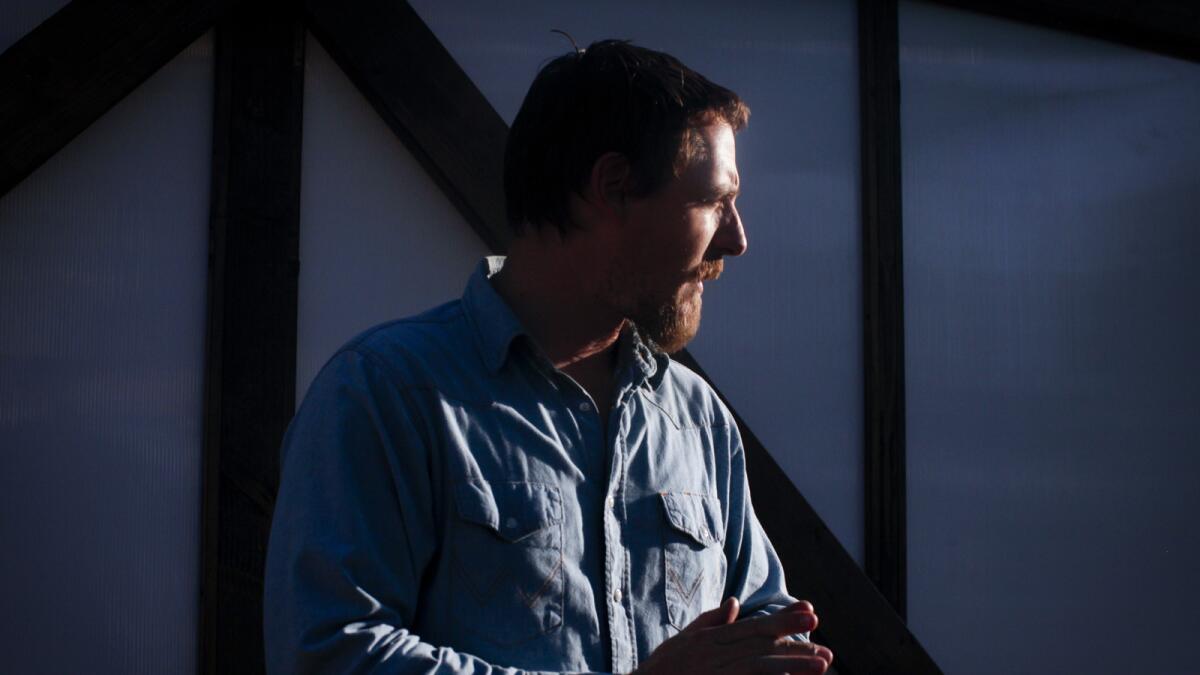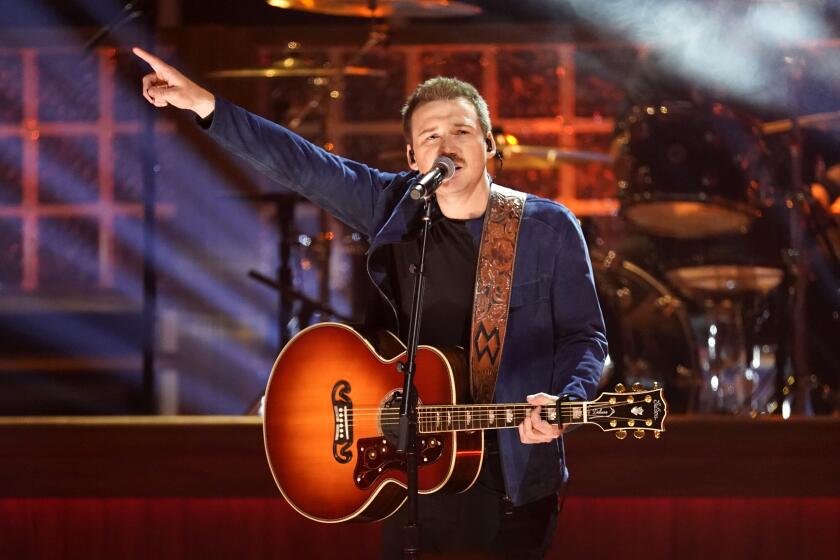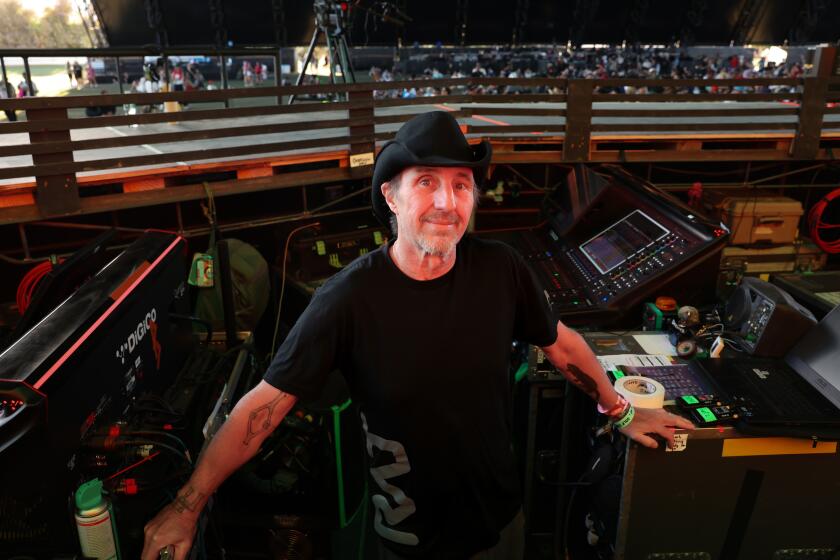Stagecoach 2015: Sturgill Simpson making noise as he straddles country line

Sturgill Simpson’s riding a wave of crossover buzz after a turn at Coachella, with Stagecoach and plenty more fests on his agenda.
For many performers working in Southern California, getting one’s own Star Waggon is as an indication that one has arrived. For Sturgill Simpson, the trailer with his name on it felt more like a reminder of where he’d been.
“The first house I ever lived in looked a lot like this,” said the deep-voiced country singer with a laugh as he eyed the dingy carpet and laminate countertops of his backstage accommodations at this month’s Coachella Valley Music and Arts Festival. Recalling his childhood in a trailer home near the freeway in eastern Kentucky, he added: “I should’ve put a star on the front door — that would’ve told everyone I was somebody special.”
He was joking, but years after those hardscrabble beginnings, somebody special is just who he’s become. Perhaps the most talked-about new act in roots music, Simpson, 36, is making waves with an idiosyncratic style that honors the sound of old-fashioned country even as it looks beyond the form for fresh textures and themes.
In January, his acclaimed 2014 album “Metamodern Sounds in Country Music” beat out higher-profile efforts by Miranda Lambert and Eric Church to win the annual critics poll organized by alt-weekly Nashville Scene. And this weekend he’ll return to Indio’s Empire Polo Club, where the rock- and pop-oriented Coachella takes place, for a gig at Stagecoach, the country festival headlined this year by Lambert, Blake Shelton and Tim McGraw.
What’s more, in playing both Coachella and Stagecoach, Simpson adds to a short (and impressive) list that includes Willie Nelson and Dwight Yoakam — lodestars for any artist pushing at country’s boundaries.
“Which festival, like, represents our demographic? Man, I don’t know,” the singer said in his coal-country drawl as he relaxed on a sofa following his performance at Coachella. “I’m not sure where I even land anymore, to be honest with you. A lot of the other bigger acts that are playing Stagecoach, I don’t know that we get associated with them any more than we do the acts at Coachella.” He laughed again. “It’s not something I really worry about. We’re just happy to be able to play.”
To play for a paying audience, that is. The son of a secretary and an undercover narcotics cop, Simpson grew up playing music at home with his family, in particular his two grandfathers. Later, between stints in the Navy and working at a railroad yard, he joined a rough-and-tumble bluegrass band called Sunday Valley, which got him comfortable onstage but didn’t exactly provide a living.
“You make a little noise, and you can sell out your local hometown club,” he remembered. “But then you drive an hour down the road to the next town, and there might be eight people there.” Simpson continued to struggle until his wife encouraged a move to Nashville to try a solo career. His 2013 debut, “High Top Mountain” — which he put out through his own independent label — garnered praise for its heartfelt vocals and handsome arrangements.
Yet things didn’t really take off until the release last May of “Metamodern Sounds,” whose title nods to “Modern Sounds in Country and Western Music,” Ray Charles’ landmark crossover disc from 1962. The idea, Simpson said, was to retain the structure of classic Nashville fare while “exploring untraditional lyrical content,” meaning the heady concepts about physics and perception that he’d been reading about in books such as “The Spirit Molecule” by Dr. Rick Strassman.
If that makes the music sound dryly academic, it’s not: “Marijuana, LSD, psilocybin, DMT / They all changed the way I see,” Simpson sings in “Turtles All the Way Down,” before adding, “But love’s the only thing that ever saved my life.” Sonically, the record has a lean electricity partly attributable to the fact that Simpson and his band recorded it in a mere four days, according to producer Dave Cobb.
“Everybody was all together in one room, staring at each other with no headphones on, like teenagers playing in a basement,” said Cobb, known for his work with Shooter Jennings and Jamey Johnson, two Nashville outliers to whom Simpson has been compared. (Jennings’ late father Waylon, an icon of the so-called outlaw country movement, is another frequent touchstone.)
“Sturgill’s had a lot of time to soak in life experience,” Cobb continued. “I think he’s just figured out what kind of records he wants to make.”
Indeed, the singer says he’s grateful he didn’t find success earlier than he did, both because perspective has deepened his songwriting and because he’s able to take all the back-slapping in stride.
“Ten years ago I wouldn’t have known what to do,” he said. “I probably would’ve been some kind of cliché. But being 36, maybe I’m just jaded enough not to take it that seriously.”
He never had much of a stomach for working a room, he explained — “going out to bars, shaking hands, looking over shoulders to see who else’s hands you should be shaking.” And his entree into more important rooms over the last year hasn’t changed that. “I don’t leave the house a lot,” he said of his home in Nashville, where he lives with his wife and their 10-month-old son. “I pretty much just hang out with the kid. I want like three more, because that’s all I ever want to do.”
Still, he knows this is the moment to put his energy into music. After Stagecoach, he’ll spend much of the summer hitting other large festivals, including Bonnaroo, Lollapalooza and Nelson’s annual Fourth of July Picnic in Austin, Texas, where Simpson shares the bill with Merle Haggard and Kacey Musgraves.
He also recently signed a major-label deal with Atlantic Records, whose Gregg Nadel said he was excited to “help bring Sturgill’s vision for his art” to a broader audience. Neither man said he knew when the next record would appear. But Simpson is already well into thinking about it.
“We come off the road for a bit on May 4, and I’ll take the guys into the studio on the 8th and woodshed some things,” he said. At the suggestion that that didn’t sound like much of a breather, he replied that it’s best to record straight from a tour, when “everyone’s good and greasy and communicating well.”
Nevertheless, he admitted he’s had to get the hang of such advance planning, not a natural fit for him but a necessity in a world where “producers have to be booked and microphones have to be reserved and people have to be told not to bother you between this day and this day.” Scheduling the creation of art, in other words, is something he’s still getting used to.
“Time to make the doughnuts,” he said with a chuckle. “It’s all right, though. It beats nobody caring.”
Get more entertainment news on Facebook
More to Read
The biggest entertainment stories
Get our big stories about Hollywood, film, television, music, arts, culture and more right in your inbox as soon as they publish.
You may occasionally receive promotional content from the Los Angeles Times.







